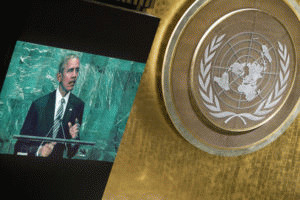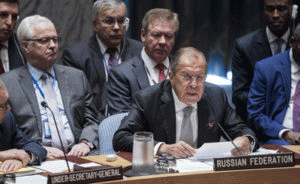This piece was reprinted by OpEd News with permission or license. It may not be reproduced in any form without permission or license from the source.
VIPS Memo reprinted from Consortium News

President Barack Obama addresses the General Assembly's seventy-first session on Sept. 20, 2016
(Image by (UN Photo)) Details DMCA
ALERT MEMORANDUM FOR: The President
FROM: Veteran Intelligence Professionals for Sanity
SUBJECT: PREVENTING STILL WORSE IN SYRIA
We write to alert you, as we did President George W. Bush, six weeks before the attack on Iraq, that the consequences of limiting your circle of advisers to a small, relatively inexperienced coterie with a dubious record for wisdom can prove disastrous.* Our concern this time regards Syria.
We are hoping that your President's Daily Brief tomorrow will give appropriate attention to Saturday's warning by Russia's Foreign Ministry spokesperson Maria Zakharova: "If the US launches a direct aggression against Damascus and the Syrian Army, it would cause a terrible, tectonic shift not only in the country, but in the entire region."
Speaking on Russian TV, she warned of those whose "logic is 'why do we need diplomacy' ... when there is power ... and methods of resolving a problem by power. We already know this logic; there is nothing new about it. It usually ends with one thing -- full-scale war."
We are also hoping that this is not the first you have heard of this -- no doubt officially approved -- statement. If on Sundays you rely on the "mainstream" press, you may well have missed it. In the Washington Post, an abridged report of Zakharova's remarks (nothing about "full-scale war") was buried in the last paragraph of an 11-paragraph article titled "Hospital in Aleppo is hit again by bombs." Sunday's New York Times totally ignored the Foreign Ministry spokesperson's statements.
In our view, it would be a huge mistake to allow your national security advisers to follow the example of the Post and Times in minimizing the importance of Zakharova's remarks.
Events over the past several weeks have led Russian officials to distrust Secretary of State John Kerry. Indeed, Foreign Minister Sergey Lavrov, who parses his words carefully, has publicly expressed that distrust. Some Russian officials suspect that Kerry has been playing a double game; others believe that, however much he may strive for progress through diplomacy, he cannot deliver on his commitments because the Pentagon undercuts him every time. We believe that this lack of trust is a challenge that must be overcome and that, at this point, only you can accomplish this.
It should not be attributed to paranoia on the Russians' part that they suspect the Sept. 17 U.S. and Australian air attacks on Syrian army troops that killed 62 and wounded 100 was no "mistake," but rather a deliberate attempt to scuttle the partial cease-fire Kerry and Lavrov had agreed on -- with your approval and that of President Putin -- that took effect just five days earlier.
In public remarks bordering on the insubordinate, senior Pentagon officials showed unusually open skepticism regarding key aspects of the Kerry-Lavrov deal. We can assume that what Lavrov has told his boss in private is close to his uncharacteristically blunt words on Russian NTV on Sept. 26:
"My good friend John Kerry " is under fierce criticism from the US military machine. Despite the fact that, as always, [they] made assurances that the US Commander in Chief, President Barack Obama, supported him in his contacts with Russia (he confirmed that during his meeting with President Vladimir Putin), apparently the military does not really listen to the Commander in Chief."
Lavrov's words are not mere rhetoric. He also criticized JCS Chairman Joseph Dunford for telling Congress that he opposed sharing intelligence with Russia, "after the agreements concluded on direct orders of Russian President Vladimir Putin and US President Barack Obama stipulated that they would share intelligence. ... It is difficult to work with such partners. ..."

Sergey V. Lavrov, Minister for Foreign Affairs of the Russian Federation, addresses a high-level meeting of the Security Council on the situation in Syria on Sept. 21, 2016
(Image by (UN Photo)) Details DMCA
(Note: You can view every article as one long page if you sign up as an Advocate Member, or higher).





